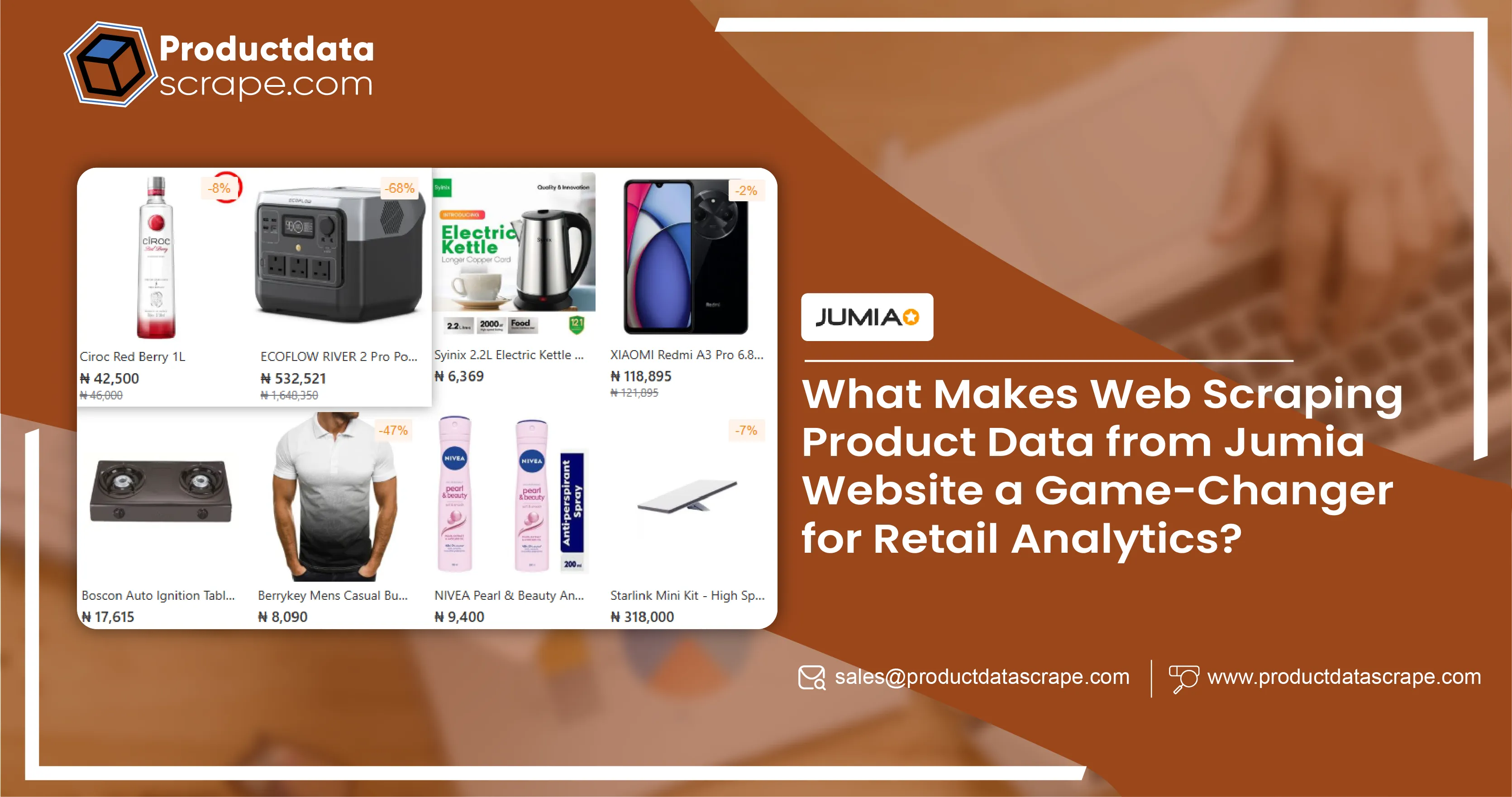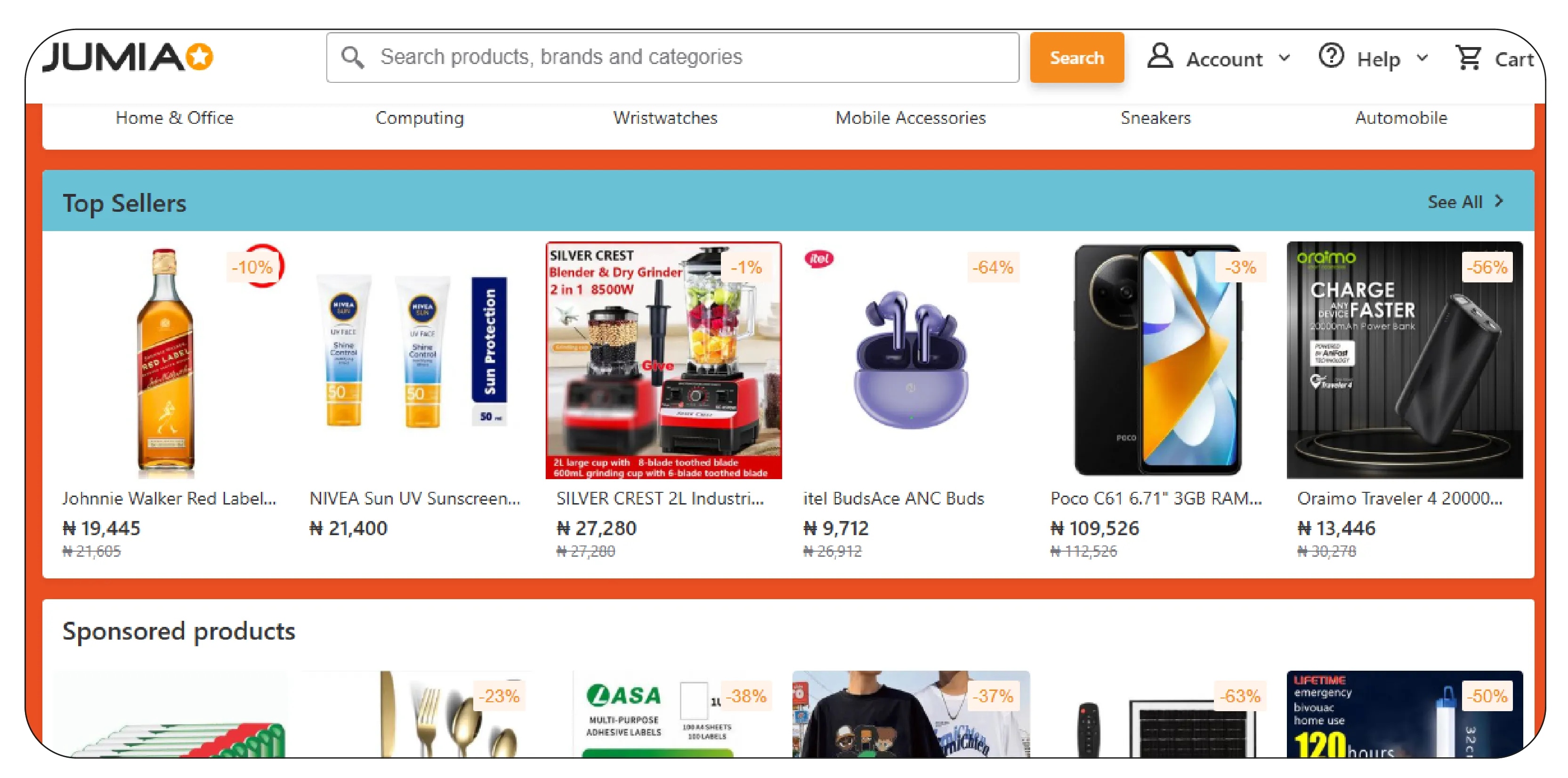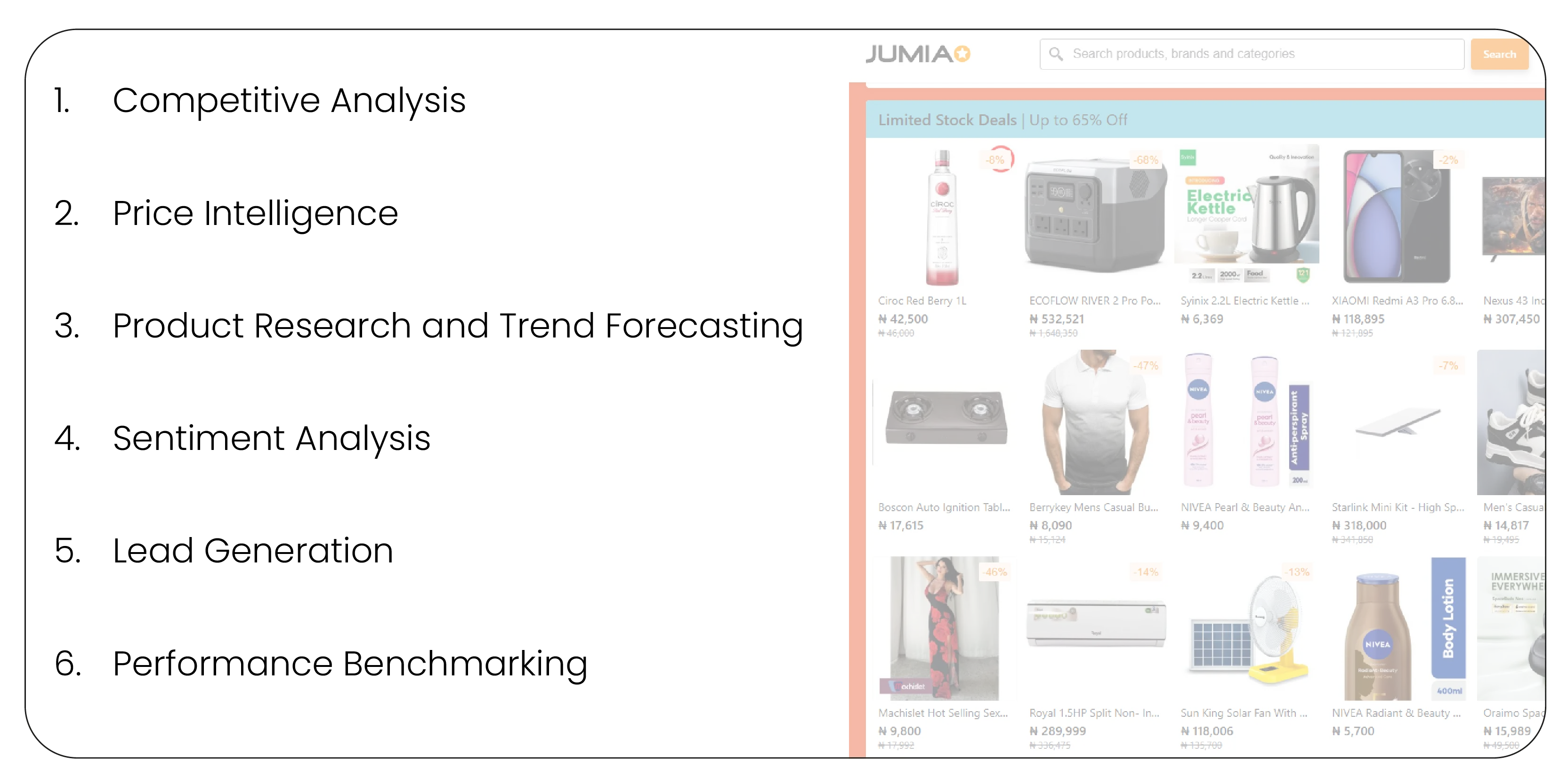
Introduction
In the ever-evolving world of online retail, businesses and data enthusiasts constantly seek
accurate, real-time, and structured data to understand market trends, competitor strategies, and
consumer behavior. Africa's e-commerce landscape is thriving, and among its leading players,
Jumia has emerged as a dominant force. As a digital marketplace that connects millions of
customers and thousands of sellers, Jumia hosts a vast and dynamic product catalog that makes it
a goldmine of data for analysis and innovation. Web Scraping Product Data from the Jumia Website
has become a strategic method to collect this treasure trove of retail insights efficiently and
systematically.
An Overview of the Jumia Website and Its Product Categories

Jumia, often dubbed the "Amazon of Africa," operates across more than 10 African countries,
including Nigeria, Kenya, Egypt, and Morocco. It is Africa's premier online shopping platform
and offers a wide array of products and services across categories such as:
-
Electronics: Smartphones, laptops, tablets, televisions, accessories, and
gadgets from global and local brands. These products cater to both budget-conscious
consumers and premium buyers, supporting digital lifestyles across age groups.
-
Fashion: Clothing, shoes, and accessories for men, women, and children,
catering to diverse styles and budgets. Trend-focused inventory helps brands keep pace with
seasonal demands and regional preferences.
-
Home and Living: Furniture, kitchen appliances, home décor, and cleaning
products that enhance comfort and functionality. These items support modern and traditional
households with both aesthetic and practical solutions.
-
Health and Beauty: Cosmetics, skincare, supplements, and personal care
essentials. These products address wellness needs and beauty routines, and are often
tailored to specific demographics and skin types.
-
Groceries and Essentials: Food, beverages, household supplies, and baby
products forming part of daily needs. These items are crucial for high-frequency purchases
and repeat consumer engagement.
-
Automotive and Industrial Tools: Car accessories, machinery, and equipment
for both consumers and small businesses. This category supports repair, maintenance, and
industrial operations across sectors.
With thousands of product listings constantly updated with prices, discounts,
seller ratings, reviews, and availability, Jumia presents a rich dataset for any analyst or
developer aiming to Extract Jumia Product Data for various use cases.
Why Scraping Jumia Product Data Matters?
The dynamic nature of Jumia's inventory and pricing structures makes it
difficult to monitor manually. Data scraping allows for the automated collection of this
information, enabling businesses to make informed decisions based on live data rather than
outdated assumptions. Whether tracking the latest smartphone launches or monitoring price
fluctuations of daily-use items, scraping Jumia's data empowers decision-makers with actionable
insights.
When organizations Scrape Jumia Product Listings Data, they are better equipped
to:
-
Identify top-selling products and trending brands: Analyze marketplace
data to determine
which items are leading in sales and which brands are gaining popularity. This helps in
optimizing product listings and curating high-demand inventories.
-
Understand competitor pricing strategies: Track how competitors price
their products across
categories to stay competitive. Use this data to adjust pricing dynamically and identify
opportunities for promotional offers.
-
Monitor user reviews for customer sentiment: Analyze product feedback to
assess satisfaction
levels, identify common issues, and improve offerings based on real consumer experiences.
-
Track inventory levels and stock availability: Keep an eye on stock
status and replenishment
cycles to avoid out-of-stock situations. This helps maintain sales continuity and improves
customer trust.
-
Evaluate seller performance and delivery efficiency: Measure delivery
timelines, order
accuracy, and seller ratings to ensure optimal service levels. Identify gaps and improve
logistics or seller partnerships where needed.
This data can be harvested without direct integrations or costly manual labor,
making it a high-return investment for growing businesses.
Key Purposes of Scraping Product Data from Jumia

Scraping e-commerce platforms like Jumia serves various business, technology,
and research purposes. Some of the most prevalent objectives include:
1. Competitive Analysis: Compare your brand or products with
similar offerings listed on Jumia to understand their market position.
2. Price Intelligence: Automate tracking product pricing
changes to remain competitive in real-time.
3. Product Research and Trend Forecasting: Analyze which
product categories are gaining momentum in specific regions.
4. Sentiment Analysis: Extract customer reviews and ratings
for natural language processing to understand user sentiment.
5. Lead Generation: Identify high-performing sellers and
potential distribution partners.
6. Performance Benchmarking: Evaluate service delivery and
user satisfaction indicators.
In a digital economy where data-driven strategies yield better outcomes,
Real-Time
Jumia Product Data Scraping has become crucial for maintaining agility in a fast-paced
marketplace.
Applications and Benefits of Scraped Jumia Product Data
Scraping product data from Jumia is not just about data collection—it's about
transforming that data into strategic value. Here are some key ways businesses and researchers
benefit from scraped datasets:
-
Market Entry Planning: Startups planning to launch products in African
markets can use Jumia data to assess demand and competition.
-
Retail Intelligence Dashboards: Build interactive dashboards that update in
real-time to track Jumia's product performance, customer behavior, and category trends.
-
Price Comparison Engines: Create tools that allow users to compare prices
across different platforms, helping them make informed purchasing decisions.
-
Dynamic Pricing Models: Use scraped data to develop machine learning models
that optimize pricing for online stores.
-
Demand Forecasting: Analyze past sales data trends (via stock status,
reviews, etc.) to predict future demand more accurately.
Using a Jumia E-commerce Product Data Scraper, data can be organized, analyzed,
and visualized across various business intelligence tools. Whether a marketing team seeks
customer insights or a procurement team looks to optimize supply chains, the applications are
diverse and impactful.
The Role of APIs and Automation in Scraping Jumia Data

While scraping data using scripts and crawlers is common, integrating
automation through APIs allows for more structured and scalable data pipelines. A Web Scraping
API for Jumia Products can be configured to extract specific data points like product title,
price, seller name, stock level, customer rating, discount percentage, and more. These APIs
enable real-time synchronization with Jumia's ever-changing product catalog, eliminating the
need for manual refreshes or outdated datasets.
This approach is especially beneficial for businesses with large-scale data
needs, such as online aggregators, logistics players, or digital marketing firms that rely on
timely and accurate product data.
Unlock powerful retail insights today with our advanced
data scraping solutions—start extracting value from Jumia now!
Contact Us Today!
The Significance of Price and Inventory Datasets
One of the most valuable datasets that businesses focus on is pricing. With
thousands of product SKUs on Jumia, price volatility can be monitored and leveraged. Companies
Scrape the Jumia Product Price Dataset to study pricing algorithms, understand promotional
patterns, and adjust their product offerings accordingly.
Another significant metric is stock availability. Tracking product availability
helps supply chain planning and estimating demand for seasonal products, gadgets, or
consumables.
In a broader scope, when organizations Extract E-commerce Data from platforms like Jumia, they
gain access to deep insights previously obscured by the vastness of digital catalogs.
The Future of E-Commerce Scraping: Jumia's Growing Role
As digital adoption in Africa continues to grow, the scope of e-commerce
platforms like Jumia is expected to expand even further. The continent is experiencing a rapid
increase in internet penetration, mobile usage, and digital payments. Jumia can leverage this
momentum by broadening its product base, increasing seller participation, and offering
hyper-local services.
Consequently, the need for Web Scraping E-commerce Websites like Jumia will
grow exponentially. To remain competitive in African markets, businesses will demand more
granular, real-time, and region-specific data. Data scraping will no longer be a nice-to-have
tool; it will be an essential engine for data-driven decisions.
Advanced technologies like AI, machine learning, and big data analytics will
increasingly rely on structured, scraped datasets from platforms like Jumia. Furthermore,
Ecommerce Data
Scraping Services are evolving to offer customized, real-time, high-frequency
scraping options that make e-commerce analytics possible and predictive.
As data infrastructure improves across the African continent, the quality,
quantity, and strategic value of the insights gathered from scraping will also increase.
The Importance of Comprehensive E-Commerce Datasets

Access to a well-structured Ecommerce Product Price Dataset
allows retailers,
researchers, and policymakers to study pricing anomalies, regional economic patterns, and market
demands. Combining data from Jumia with other datasets unlocks macro-level insights into
Africa's growing digital economy.
In addition to raw pricing data, scraped metadata—such as review frequency,
brand popularity, or delivery timelines—provides nuanced context for every decision. This makes
it easier for businesses to optimize campaigns, fine-tune their listings, and cater to customer
needs in real-time.
How Product Data Scrape Can Help You?
-
Boosts Market Research Efficiency: Gather detailed product and pricing data
to accelerate competitor analysis and consumer trend identification.
-
Enhances Decision-Making: Access accurate, real-time datasets to support
smarter pricing, inventory planning, and product launch strategies.
-
Supports Business Intelligence Tools: Seamlessly integrate scraped data
into BI platforms to generate actionable insights and performance dashboards.
-
Saves Time and Resources: Eliminate manual data collection efforts through
automated scraping workflows customized to your business goals.
-
Enables Predictive Analytics: Use historical and real-time data to forecast
demand patterns, optimize operations, and stay ahead of market shifts.
Final Thoughts
In conclusion, Jumia represents more than just a digital storefront—it is a
reflection of Africa's thriving and evolving consumer landscape. For businesses aiming to
succeed in this market, harnessing the power of data is non-negotiable.
Extract Popular
E-Commerce Website Data like Jumia to decode consumer behavior, evaluate product
trends, and
build intelligent, responsive strategies.
Whether you're a data scientist, a marketer, an entrepreneur, or an analyst,
leveraging Web Scraping Product Data from Jumia Website opens the doors to unprecedented market
understanding. As competition grows fiercer and the digital space becomes increasingly crowded,
access to accurate, real-time data will be the difference between leading and lagging.
By embedding data scraping into their core strategy, modern businesses are not just reacting to
the market but shaping it.
At Product Data Scrape, we strongly emphasize
ethical practices across all our services,
including Competitor Price Monitoring and
Mobile App Data Scraping. Our commitment to
transparency and integrity is at the heart of everything we do. With a global presence and a
focus on personalized solutions, we aim to exceed client expectations and drive success in
data
analytics. Our dedication to ethical principles ensures that our operations are both
responsible
and effective.






































.webp)





.webp)
.webp)